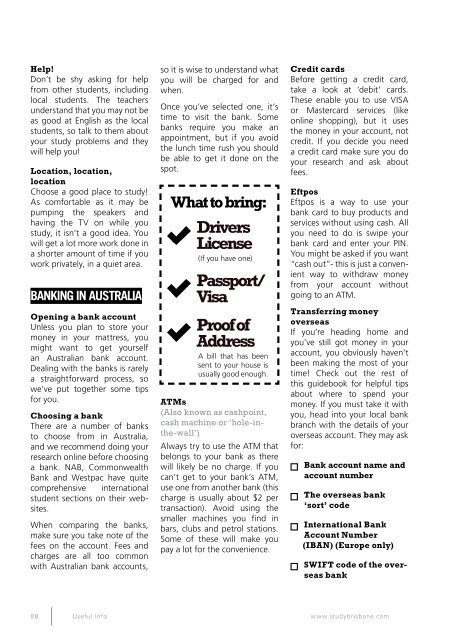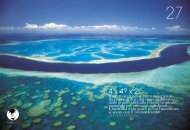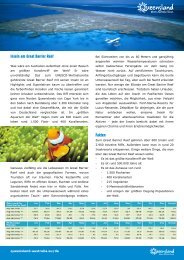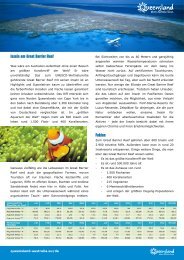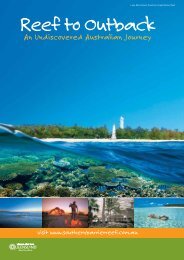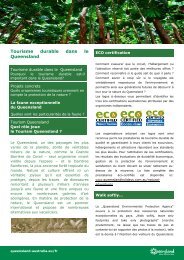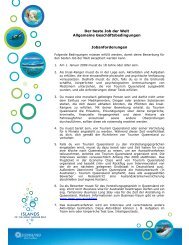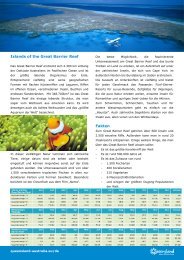Brisbane! - Queensland-australia.eu
Brisbane! - Queensland-australia.eu
Brisbane! - Queensland-australia.eu
Create successful ePaper yourself
Turn your PDF publications into a flip-book with our unique Google optimized e-Paper software.
Help!<br />
Don’t be shy asking for help<br />
from other students, including<br />
local students. The teachers<br />
understand that you may not be<br />
as good at English as the local<br />
students, so talk to them about<br />
your study problems and they<br />
will help you!<br />
Location, location,<br />
location<br />
Choose a good place to study!<br />
As comfortable as it may be<br />
pumping the speakers and<br />
having the TV on while you<br />
study, it isn’t a good idea. You<br />
will get a lot more work done in<br />
a shorter amount of time if you<br />
work privately, in a quiet area.<br />
Banking in Australia<br />
Opening a bank account<br />
Unless you plan to store your<br />
money in your mattress, you<br />
might want to get yourself<br />
an Australian bank account.<br />
Dealing with the banks is rarely<br />
a straightforward process, so<br />
we’ve put together some tips<br />
for you.<br />
Choosing a bank<br />
There are a number of banks<br />
to choose from in Australia,<br />
and we recommend doing your<br />
research online before choosing<br />
a bank. NAB, Commonwealth<br />
Bank and Westpac have quite<br />
comprehensive international<br />
student sections on their websites.<br />
When comparing the banks,<br />
make sure you take note of the<br />
fees on the account. Fees and<br />
charges are all too common<br />
with Australian bank accounts,<br />
so it is wise to understand what<br />
you will be charged for and<br />
when.<br />
Once you’ve selected one, it’s<br />
time to visit the bank. Some<br />
banks require you make an<br />
appointment, but if you avoid<br />
the lunch time rush you should<br />
be able to get it done on the<br />
spot.<br />
What to bring:<br />
Drivers<br />
License<br />
(If you have one)<br />
Passport/<br />
Visa<br />
Proof of<br />
Address<br />
A bill that has been<br />
sent to your house is<br />
usually good enough.<br />
ATMs<br />
(Also known as cashpoint,<br />
cash machine or ‘hole-inthe-wall’)<br />
Always try to use the ATM that<br />
belongs to your bank as there<br />
will likely be no charge. If you<br />
can’t get to your bank’s ATM,<br />
use one from another bank (this<br />
charge is usually about $2 per<br />
transaction). Avoid using the<br />
smaller machines you find in<br />
bars, clubs and petrol stations.<br />
Some of these will make you<br />
pay a lot for the convenience.<br />
Credit cards<br />
Before getting a credit card,<br />
take a look at ‘debit’ cards.<br />
These enable you to use VISA<br />
or Mastercard services (like<br />
online shopping), but it uses<br />
the money in your account, not<br />
credit. If you decide you need<br />
a credit card make sure you do<br />
your research and ask about<br />
fees.<br />
Eftpos<br />
Eftpos is a way to use your<br />
bank card to buy products and<br />
services without using cash. All<br />
you need to do is swipe your<br />
bank card and enter your PIN.<br />
You might be asked if you want<br />
“cash out”- this is just a convenient<br />
way to withdraw money<br />
from your account without<br />
going to an ATM.<br />
Transferring money<br />
overseas<br />
If you’re heading home and<br />
you’ve still got money in your<br />
account, you obviously haven’t<br />
been making the most of your<br />
time! Check out the rest of<br />
this guidebook for helpful tips<br />
about where to spend your<br />
money. If you must take it with<br />
you, head into your local bank<br />
branch with the details of your<br />
overseas account. They may ask<br />
for:<br />
Bank account name and<br />
account number<br />
The overseas bank<br />
‘sort’ code<br />
International Bank<br />
Account Number<br />
(IBAN) (Europe only)<br />
SWIFT code of the overseas<br />
bank<br />
You may need to contact your<br />
overseas bank, but usually the<br />
above information can be found<br />
on their website.<br />
Transferring money to<br />
Australia<br />
Need a top up from a relative<br />
back home? Here’s the information<br />
you’ll need to give them:<br />
Australian bank account<br />
name<br />
Australian bank account<br />
number and BSB<br />
Address of the bank<br />
your account is with<br />
Australian bank SWIFT<br />
Code<br />
Currency conversion<br />
Travelex outlets are basically<br />
a one stop shop for currency<br />
conversion. These outlets can<br />
be found in a number of locations.<br />
These include airports,<br />
major travel agents and tourist<br />
areas. Most banks also offer<br />
conversion facilities.<br />
Web links<br />
Department of Immigration<br />
www.immi.gov.au<br />
Australian Tax Office<br />
www.ato.gov.au<br />
Workplace Authority<br />
www.workplaceauthority.gov.au<br />
Online Job Sites<br />
www.mycareer.com.au<br />
www.seek.com.au<br />
www.careerone.com.au<br />
Looking for Work<br />
By Florence Wong<br />
Working while studying has many great benefits,<br />
not only in terms of earning a bit more spending<br />
money, but is a great way to make new friends<br />
outside university and gain work experience and<br />
skills in Australia.<br />
As an international student, the first thing to check<br />
is whether you have working rights before starting<br />
your search for a job. Usually, you will be permitted<br />
to work for 20 hours during term time, and unlimited<br />
hours when your course is not in session (such<br />
as over semester breaks, or, if you are a postgraduate<br />
research student, after you have handed in your<br />
thesis). However, you should check your documentation<br />
to make sure.<br />
Additionally, before you start looking for work,<br />
you will also need to apply for a Tax File Number, a<br />
straightforward process through the Australian Tax<br />
Office.<br />
Once you’ve got that out of the way, prepare a good<br />
resume and start looking!<br />
Good sources of work include job notice boards<br />
at your university, or through online job sites (see<br />
left). Local newspapers are also a good source for<br />
casual and part-time jobs in the area where you live<br />
(particularly important if you need to rely on public<br />
transport).<br />
Many larger organisations, such as supermarkets or<br />
department stores recruit through their websites, so<br />
it’s also worth going there to have a look. Smaller<br />
shops and cafes will sometimes post vacancies on<br />
their windows, so keep your eye out when you’re<br />
wandering around. If there’s a particular place that<br />
you’d like to work, don’t be afraid to walk in and talk<br />
to the manager or hand over your resume. Even if<br />
they don’t have an opening then, they can keep you<br />
in mind when they are looking to hire.<br />
88 Useful Info<br />
www.studybrisbane.com


